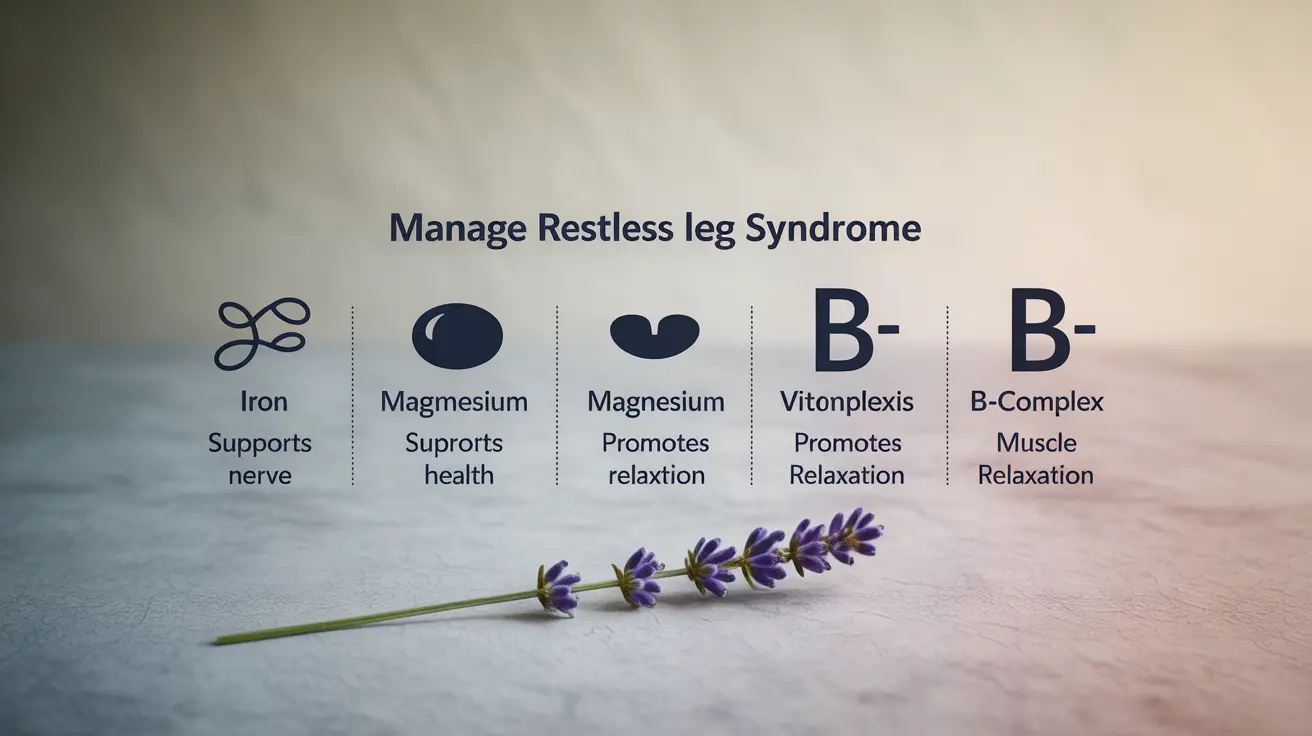Restless leg syndrome (RLS) can significantly impact quality of life, causing uncomfortable sensations and an irresistible urge to move the legs, especially at night. While medication is sometimes necessary, many people find relief through specific supplements that target the underlying causes of RLS symptoms. Understanding which supplements may help and how to use them safely is crucial for managing this challenging condition.
This comprehensive guide explores the most effective supplements for restless leg syndrome, including their benefits, proper usage, and potential risks. We'll examine the scientific evidence behind each supplement and provide practical guidance for incorporating them into your RLS management strategy.
Iron Supplementation: A Fundamental Approach
Iron deficiency is strongly linked to restless leg syndrome, making iron supplementation a cornerstone of RLS treatment. Research shows that low iron levels in the brain can disrupt dopamine function, potentially triggering or worsening RLS symptoms.
The recommended approach for iron supplementation includes:
- Taking iron supplements on an empty stomach
- Combining with vitamin C to enhance absorption
- Regular monitoring of ferritin levels through blood tests
- Following healthcare provider guidance for proper dosing
Optimal Iron Supplementation Strategy
For best results, iron supplements should be taken with 100mg of vitamin C to maximize absorption. However, avoid taking iron with calcium-rich foods or coffee, as these can interfere with absorption. Most healthcare providers recommend ferrous sulfate, typically dosed at 325mg daily for RLS patients with low ferritin levels.
Magnesium: The Muscle Relaxation Mineral
Magnesium plays a crucial role in muscle function and nervous system regulation. This mineral can help reduce the frequency and intensity of RLS symptoms by:
- Promoting muscle relaxation
- Supporting healthy nerve function
- Improving sleep quality
- Reducing muscle cramps and tension
The recommended form is magnesium citrate or glycinate, as these are better absorbed than magnesium oxide. Typical dosages range from 300-400mg daily, taken in the evening.
Essential B Vitamins for Nerve Health
B vitamins, particularly B12 and B6, are crucial for maintaining healthy nerve function and may help alleviate RLS symptoms. These vitamins support:
- Nerve tissue health
- Proper neurotransmitter function
- Red blood cell production
- Energy metabolism
Vitamin B Complex Benefits
A comprehensive B-complex supplement can provide multiple benefits for RLS sufferers. Look for supplements containing adequate amounts of B12 (1000-2000mcg) and B6 (50-100mg) for optimal results.
Additional Supportive Vitamins
Several other vitamins may provide additional support for RLS management:
- Vitamin D: Supports muscle function and may reduce symptom severity
- Vitamin E: Acts as an antioxidant and may help with circulation
- Folate: Works synergistically with B12 for nerve health
Frequently Asked Questions
What supplements are most effective for reducing restless leg syndrome symptoms?
Iron, magnesium, and B-complex vitamins are typically the most effective supplements for RLS. Iron supplementation is particularly crucial for those with low ferritin levels, while magnesium can help with muscle relaxation and sleep quality. B vitamins support overall nerve health and function.
How does iron supplementation help with restless legs syndrome and should it be taken with vitamin C?
Iron supplementation helps by addressing potential deficiencies that can trigger RLS symptoms and supporting proper dopamine function in the brain. Taking iron with vitamin C (about 100mg) is recommended as it significantly improves absorption. However, the supplements should be taken on an empty stomach for best results.
Can magnesium and vitamin B6 improve sleep quality in people with restless legs syndrome?
Yes, both magnesium and vitamin B6 can improve sleep quality in RLS patients. Magnesium helps relax muscles and calm the nervous system, while B6 supports the production of neurotransmitters that regulate sleep. Together, they can help reduce nighttime symptoms and improve overall sleep quality.
Are vitamins C, D, and E safe and beneficial for managing restless leg syndrome symptoms?
These vitamins are generally safe and can be beneficial when used appropriately. Vitamin C helps with iron absorption, vitamin D supports muscle function, and vitamin E may improve circulation. However, it's important to stay within recommended dosages and consult with a healthcare provider before starting any supplement regimen.
What are the possible side effects and risks of taking supplements for restless leg syndrome?
Common side effects may include digestive issues with iron supplements, mild nausea with magnesium, and potential interactions with medications. High doses of certain supplements can be harmful. Iron overload is possible with excessive supplementation, and some B vitamins may cause nerve issues if taken in very high doses. Always consult with a healthcare provider before starting supplements, especially if you're taking medications.




